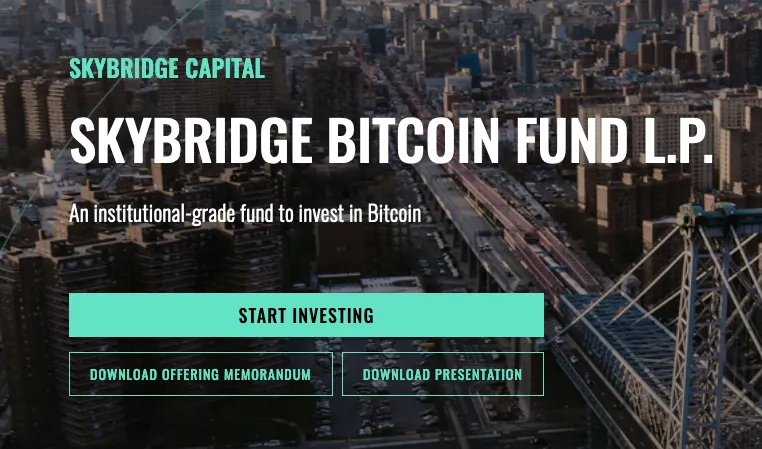In brief
- Skybridge Capital COO Brett Messing said the company's Bitcoin Fund grew to $370 million.
- Messing also said the emergence of a Bitcoin ETF could put the company's Bitcoin Fund out of business.
- Institutions have been increasingly investing in Bitcoin, but there is no guarantee this will continue.
Skybridge Capital’s Bitcoin Fund grew to $360 million dollars in its first few weeks, according to COO Brett Messing.
Skybridge never planned on getting into Bitcoin, according to Messing. But in November and December 2020, Skybridge invested hundreds of millions of dollars into Bitcoin on behalf of its funds, launching its Skybridge Bitcoin Fund on January 4, 2021 with $300 million at the time. And then, with an influx of new money and growth in Bitcoin's price, the fund's value rose even higher.
“We presently have a position that's valued at about $360/$370 million dollars,” he told Decrypt on Monday (although Bitcoin’s price has dropped 8% since then).
The Skybridge Bitcoin Fund
Skybridge Capital is an SEC registered investment advisory firm with over $7 billion in assets under management. It's run by former White House communications director Anthony Scaramucci.

The fund is audited by audit giant Ernst & Young, and requires a minimum investment of $50,000. Investors are also required to be accredited. Redemptions are possible on a quarterly basis with a 30 day notice, and Fidelity serves as the Bitcoin custodian.
“The mission of Skybridge was to democratize hedge funds for the mass affluent,” Messing said.
As COO, Messing is responsible for the day-to-day operations across its multiple funds. But he says that the Bitcoin Fund is surprisingly simple and efficient to run.
“Money comes in, we buy the Bitcoin, and it goes to Fidelity into cold storage,” Messing said, adding, “I ran a $3 billion long-short fund that was way more complicated than this, it’s just not that demanding from an operations standpoint.”

The Bitcoin Fund is also run by Bitcoin maximalists, who believe Bitcoin is—and will continue to be—the leading cryptocurrency on the market.
“We’re very passionate about it, we feel like we’re doing people a favour by introducing them to Bitcoin, and in success we make money,” Messing said, adding, “We’re Bitcoin maximalists, we weren’t interested in getting involved in anything else.
Messing’s own journey to Bitcoin began when he was much younger. Now, he is applying the lessons he learned in his early investment days to Bitcoin. “When I look back in my life, the best investments were to just buy the leader, always, and then sit back and do nothing.”
The threat of a Bitcoin ETF
A Bitcoin Exchange Traded Fund (ETF) is one of the most anticipated developments in the Bitcoin industry, but Messing believes it could be bad news for the growth of the Skybridge Bitcoin Fund.
“The ETF will put us out of business, in that our fund will continue on but we won’t be able to raise any capital,” Messing said, adding, “Why do I need a private fund?”
Anticipating this challenge to Skybridge’s fund, Messing thought the company would have a one to three year window to generate capital, but even that might be too optimistic.
“When we launched the fund, we assumed that there would be a one to three year window for us to raise capital,” Messing said, adding, “I now think we’ll be lucky if it’s a year.”

A Bitcoin ETF might be a challenge that lies ahead for Skybridge, but the future of institutions investing in Bitcoin is also far from guaranteed.
What might stop institutions investing in Bitcoin
The biggest threat to Bitcoin, according to Messing, is an infrastructure breakdown that causes serious investors to lose faith in Bitcoin as an asset.
“The thing I would most worry about is infrastructure breakdown. The fact that Coinbase goes down every time the market moves, I think that’s concerning to serious institutions,” Messing said.
Bitcoin—as well as the rest of the cryptocurrency industry—has already suffered major blows to its infrastructure in the past.
The most notable example of this was when the now defunct crypto exchange Mt. Gox was hacked at a time when it handled over 70% of the world’s Bitcoin transactions.
Mt.Gox did not recover and Bitcoin was dealt a huge blow to its legitimacy as an asset.
A similar collapse of infrastructure central to Bitcoin could result in institutional investors losing their interest in the cryptocurrency. “Instead of having all these Wall Street firms coming out, you could get a couple of ‘not ready, not yet, changed our minds again’,” Messing said.
Then, of course, there is the ever present threat of unknown unknowns, as Donald Rumsfeld famously said.
“You and I have talked about the pandemic, if we had spoken three or four years ago and I asked you to list the 10 biggest risks to any asset, would you have said that?” Messing said.
So there’s a hefty dose of uncertainty too.

